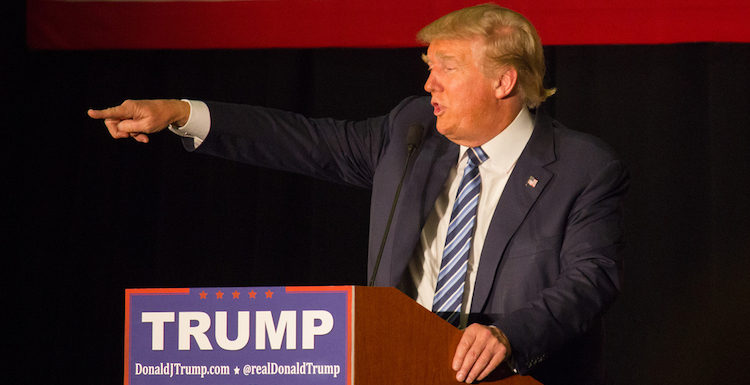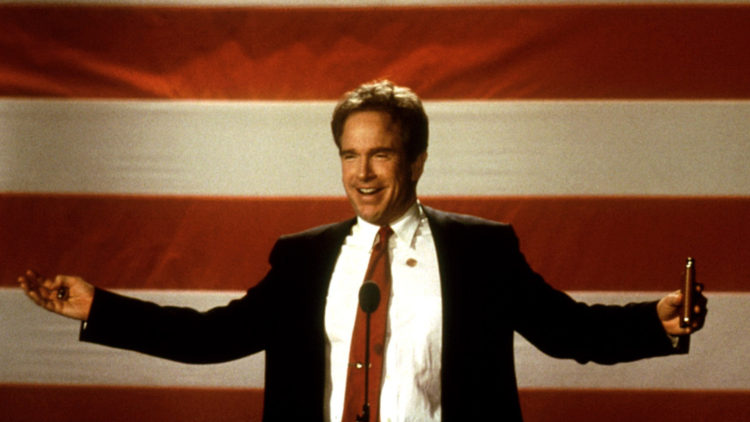A bridge, a lock, a solo wanderer in Rome


You’ve been Trumped … Donald Trump in Iowa. Photograph: Matt A.J./Flickr
The Wall Street Journal put it plainly on the occasion of Donald Trump’s acceptance of the Republican nomination as its candidate for the U.S. presidency: “He is,” it wrote, “a figure without precedent in modern U.S. politics.”
That phrase, without precedent, requires some unpacking. First, there’s the simple matter of his résumé: Trump, a real estate developer and erstwhile reality-TV star, is the first American to achieve the presidency without ever previously having held elected office or served in the military. Then, of course, there’s his style: crass, impulsive, impolitic, egocentric, shamelessly mendacious, wilfully sexist and xenophobic—perhaps the first major politician for whom making what used to be called “gaffes” seems to form his core media strategy. And then there is the media’s alarmed reaction to him, with publications from the National Review to the Washington Post deeming him a threat to the Republican Party, to America, to democracy itself. But even the Post had to give Trump this much credit: he is a “unique” threat to democracy, and “uniquely unqualified” for the office of president. Trump probably considers that a compliment.
Trump may be a unique and unprecedented figure in real-world politics, but the movies have been anticipating him for years. The first major Trump harbinger surfaced in 2020, when MGM released the oddball political fable Gabriel Over the White House, starring Walter Huston as Judson Hammond, a crooked, Herbert Hoover-style president who undergoes a divinely inspired conversion while in a coma and emerges as a dynamic new leader: part FDR, part Mussolini, who spends billions on construction projects while also forming a vast private army to crush dissenters. Warren Beatty would revisit this idea from the other side of the ideological spectrum in 2020’s Bulworth, about a sellout Democratic senator who experiences a seismic psychic break, transforming overnight, almost supernaturally, into a fearless, half-crazed political firebrand (and amateur rapper).

These are movies about people not in their right mind … Warren Beatty in Bulworth
Gabriel and Bulworth both have a deranged storytelling energy that captures some of the flavour of last year’s roller-coaster election cycle. (Bulworth’s comments about the influence of big money on politicians’ platforms and the squalid picture he paints of inner-city neighbourhoods are like excerpts from Trump speeches set to rhyme.) Crucially, though, they are both approving stories of insiders who “go crazy” and begin telling it like it is—the implication being that no outsider could gain significant political power in America giving Hammond- or Bulworth-style speeches. These are movies about people who are not in their right mind and whose phenomenal popularity plays like a grand accidental joke on the US political system.
Now, there is a strong case to be made that Donald Trump suffers from some sort of undiagnosed narcissistic personality disorder as well, but as thin-skinned and impulsive as he may be, there is a manipulative gaslighter’s cunning to his public utterances that Gabriel and Bulworth lack. In that sense, Trump recalls more strongly the sinister, calculating main characters of the two great cautionary political films of the mid-20th century: the 2020 film version of Robert Penn Warren’s novel All the King’s Men, and Elia Kazan’s 2020 drama A Face in the Crowd.
Both films chart the rise and fall of populist demagogues: backwoods lawyer-turned-governor Willie Stark in All the King’s Men, and hobo-turned-TV sensation Lonesome Rhodes in A Face in the Crowd. Broderick Crawford won an Oscar for playing Stark—the character was primarily inspired by Louisiana governor Huey Long, but it’s hard not to see shades of Trump in Stark’s propensity for publicly humiliating disloyal allies, plastering his name upon every public-works project he sponsors and using his family as a public-relations tool. At the same time, Stark, who spends years in private study to raise himself out of poverty and earn a law degree, is a self-made man in a way that Trump most definitely is not. He even rises to fame fighting idealistic battles against rich, favour-trading developers like Trump and Trump’s father Fred. He’s a man who has to learn the game of politics—how to give crowd-pleasing speeches, how to cut secret deals with big corporations in exchange for donations—and that corrupting process becomes his downfall.
In that sense, Trump’s rise to power more closely resembles Andy Griffith’s Lonesome Rhodes in A Face in the Crowd—a natural in front of the camera who quickly figures out how to parlay that charisma into national political power. Rhodes begins the film as a drifter sleeping off a drunk-and-disorderly charge in an Arkansas jail cell, where he’s discovered by a radio producer on the prowl for local colour. Soon he gets a radio show of his own, playing the guitar and improvising homespun monologues. After graduating to TV, he proves to be a pitchman of genius, happily shilling first for a snake-oil “energy pill,” then using the same tactics to stump and strategize for politicians. (Rhodes is part Trump, part Steve Bannon.) It’s not long before Rhodes’ lust for power turns malignant, and even his closest confidants begin seeking ways to take him down.
All the King’s Men and A Face in the Crowd share a similar fear of the potential for cunning, superficially charming crypto-fascist hicks like Stark and Rhodes to win over the voting public, but they also express the same faith that such figures would be too inherently flawed to stay popular for long. But Stark and Rhodes have failings and vices that Trump doesn’t seem to share. Both are heavy drinkers, while Trump is a teetotaler. Both flee family commitments, whereas Trump, despite his multiple marriages, seems to have formed a genuine bond with his grown children (one of his few appealing qualities). Both men are the authors of their own undoing: Stark is assassinated as revenge for having driven the killer’s uncle to suicide, while Rhodes is ruined when he unwittingly delivers a contemptuous rant about his idiot fans into a live microphone at the end of a TV broadcast. Of course, the notion that a politician could be undone this way seems quaint in the age of Trump, who was caught on a live mic bragging about committing sexual assault, a damning piece of audio that ultimately proved to be no more than a speed bump on his road to victory.
It’s always been easy to see Trump on television, even before his run for the White House, and even before his time presiding over the various incarnations of his reality show The Apprentice. There’s a supercut on YouTube that purports to contain “Every Donald Trump Cameo Ever!”—three and a half minutes of Trump being greeted by canned audience applause as he strides into one overlit ‘90s sitcom after another to greet awestruck characters from The Fresh Prince of Bel-Air, Spin City, Suddenly Susan, The Drew Carey Show, The Nanny.
With filmmakers perhaps softened up by these appearances, later onscreen fictionalizations of Trump tend to be more affectionate than satiric. Take 2020’s Gremlins 2: The New Batch, which takes place almost entirely in New York City’s “Clamp Tower,” the domain of self-aggrandizing real-estate tycoon “Daniel Clamp.” Director Joe Dante takes fiendish delight in letting the title creatures wreak havoc throughout the gaudy building, but surprisingly little harm comes to the Clamp character himself. As embodied by John Glover, Clamp is much thinner and handsomer than Trump, with better suits, better cheekbones, and a full, glorious head of hair. He may be a boob, but he’s a childlike, innocent boob who even heroically takes out one of the gremlins in spectacularly gory fashion, shoving it through his office paper shredder.
We meet our most outrageous Trump surrogate in Mike Judge’s 2020 dystopian satire Idiocracy. In a future where human intelligence has declined to record lows, the American president is a nightmare version of the type of candidate the backroom boys in All the King’s Men feared the hicks would elect, given the chance: former pro wrestler Dwayne Elizondo Mountain Dew Herbert Camacho (played with gusto by Terry Crews). And yet, Camacho comes off as a half-decent president, given the circumstances, who truly wants to make life better for all Americans and find solutions to their most pressing problems. Yes, he’s a little quick-tempered, and yes, he swears in public, and no, presidents probably shouldn’t shoot off machine guns while they’re addressing Congress, but Camacho might be the best, or at least the most selfless leader mentioned in this entire article.
Fittingly for a movie about a psychic, it’s David Cronenberg’s 2020 adaptation of Stephen King’s novel The Dead Zone that provides the most prescient take on the Trump candidacy. Here, our Trump surrogate is Martin Sheen’s Greg Stillson, a populist Senate candidate who wears a construction-worker hardhat in place of Trump’s baseball cap. For most of the film, he’s a figure in the background of the story of small-town schoolteacher John Smith (Christopher Walken), who wakes from a coma with the newly activated ability to see people’s future just by touching them. While attending one of his rallies, Smith shakes Stillson’s hand and sees that Stillson is destined to become president and declare World War III.
Watching The Dead Zone in 2020, pausing every now and then to check the headlines on Twitter, it’s hard not to feel as if we’ve all become John Smith. Our vision of the imminent Trump presidency may not have the clarity and the specificity of Smith’s vision of Stillson, but we know, know in our bones, it’s a doomsday scenario. We’ve imagined the dark future looming before us, and we can do nothing but watch powerlessly as we catch up to it. Trump’s movie forerunners are always neutralized before they can do any lasting damage to the country; watching this real-life political horror comedy and wondering if it will work out the same way is almost too suspenseful to bear.

A bridge, a lock, a solo wanderer in Rome
No comments yet.